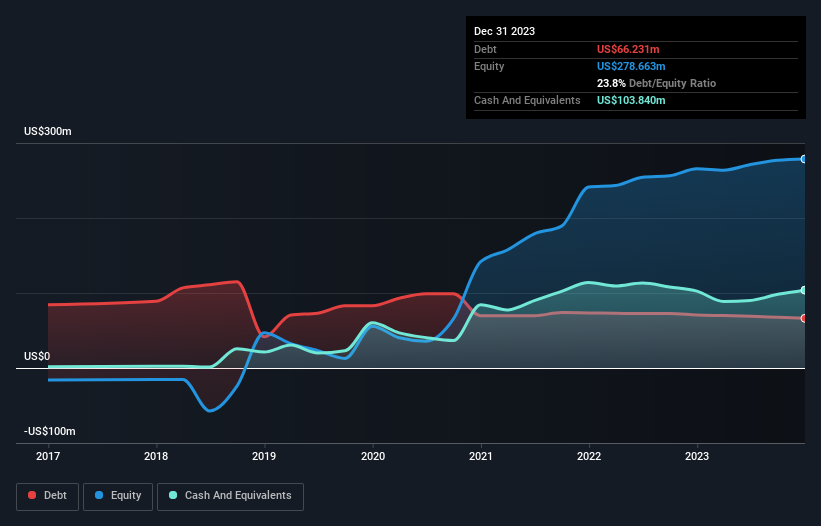
Warren Buffett famously said, 'Volatility is far from synonymous with risk.' So it might be obvious that you need to consider debt, when you think about how risky any given stock is, because too much debt can sink a company. Importantly, Organogenesis Holdings Inc. (NASDAQ:ORGO) does carry debt. But the more important question is: how much risk is that debt creating?
When Is Debt A Problem?
Debt assists a business until the business has trouble paying it off, either with new capital or with free cash flow. Ultimately, if the company can't fulfill its legal obligations to repay debt, shareholders could walk away with nothing. However, a more frequent (but still costly) occurrence is where a company must issue shares at bargain-basement prices, permanently diluting shareholders, just to shore up its balance sheet. Having said that, the most common situation is where a company manages its debt reasonably well - and to its own advantage. When we examine debt levels, we first consider both cash and debt levels, together.
Check out our latest analysis for Organogenesis Holdings
What Is Organogenesis Holdings's Net Debt?
The image below, which you can click on for greater detail, shows that Organogenesis Holdings had debt of US$66.2m at the end of December 2023, a reduction from US$70.8m over a year. However, it does have US$103.8m in cash offsetting this, leading to net cash of US$37.6m.

A Look At Organogenesis Holdings' Liabilities
We can see from the most recent balance sheet that Organogenesis Holdings had liabilities of US$80.5m falling due within a year, and liabilities of US$100.9m due beyond that. Offsetting these obligations, it had cash of US$103.8m as well as receivables valued at US$82.0m due within 12 months. So it can boast US$4.48m more liquid assets than total liabilities.
This state of affairs indicates that Organogenesis Holdings' balance sheet looks quite solid, as its total liabilities are just about equal to its liquid assets. So while it's hard to imagine that the US$391.9m company is struggling for cash, we still think it's worth monitoring its balance sheet. Succinctly put, Organogenesis Holdings boasts net cash, so it's fair to say it does not have a heavy debt load!
The modesty of its debt load may become crucial for Organogenesis Holdings if management cannot prevent a repeat of the 34% cut to EBIT over the last year. Falling earnings (if the trend continues) could eventually make even modest debt quite risky. The balance sheet is clearly the area to focus on when you are analysing debt. But ultimately the future profitability of the business will decide if Organogenesis Holdings can strengthen its balance sheet over time. So if you're focused on the future you can check out this free report showing analyst profit forecasts.
Finally, a company can only pay off debt with cold hard cash, not accounting profits. Organogenesis Holdings may have net cash on the balance sheet, but it is still interesting to look at how well the business converts its earnings before interest and tax (EBIT) to free cash flow, because that will influence both its need for, and its capacity to manage debt. Looking at the most recent three years, Organogenesis Holdings recorded free cash flow of 25% of its EBIT, which is weaker than we'd expect. That weak cash conversion makes it more difficult to handle indebtedness.
Summing Up
While we empathize with investors who find debt concerning, you should keep in mind that Organogenesis Holdings has net cash of US$37.6m, as well as more liquid assets than liabilities. So we don't have any problem with Organogenesis Holdings's use of debt. When analysing debt levels, the balance sheet is the obvious place to start. However, not all investment risk resides within the balance sheet - far from it. These risks can be hard to spot. Every company has them, and we've spotted 3 warning signs for Organogenesis Holdings you should know about.
At the end of the day, it's often better to focus on companies that are free from net debt. You can access our special list of such companies (all with a track record of profit growth). It's free.
New: AI Stock Screener & Alerts
Our new AI Stock Screener scans the market every day to uncover opportunities.
• Dividend Powerhouses (3%+ Yield)
• Undervalued Small Caps with Insider Buying
• High growth Tech and AI Companies
Or build your own from over 50 metrics.
Have feedback on this article? Concerned about the content? Get in touch with us directly. Alternatively, email editorial-team (at) simplywallst.com.
This article by Simply Wall St is general in nature. We provide commentary based on historical data and analyst forecasts only using an unbiased methodology and our articles are not intended to be financial advice. It does not constitute a recommendation to buy or sell any stock, and does not take account of your objectives, or your financial situation. We aim to bring you long-term focused analysis driven by fundamental data. Note that our analysis may not factor in the latest price-sensitive company announcements or qualitative material. Simply Wall St has no position in any stocks mentioned.
About NasdaqCM:ORGO
Organogenesis Holdings
A regenerative medicine company, develops, manufactures, and commercializes products for the advanced wound care, and surgical and sports medicine markets in the United States.
Good value with reasonable growth potential.
Similar Companies
Market Insights
Community Narratives


